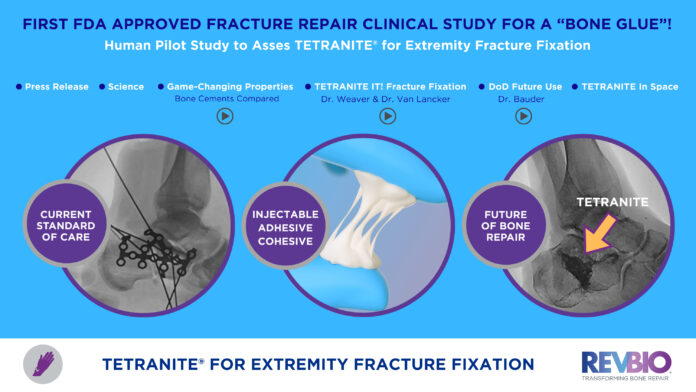LOWELL, Mass. — RevBio announced that the U.S. Food and Drug Administration has approved a 20-patient pilot study evaluating TETRANITE, the company’s first-of-its-kind regenerative “bone glue,” for the treatment of complex, multi-fragmented wrist fractures, including those involving articular surfaces. This marks the first FDA-approved clinical trial for a bone adhesive designed to restore and regenerate bone in extremity fractures, expanding the range of indications currently in clinical development for TETRANITE.
The study will assess TETRANITE’s ability to fill bone gaps, fixate bone fragments, and accelerate healing through its osteoconductive properties. The patented biomaterial will be used both as an intraoperative fixation aid and as an adjunct to traditional hardware fixation, providing immediate load sharing between bone and metal plate and screw systems. TETRANITE’s adhesive bond strength to bone—exceeding 2 MPa in shear and 30 MPa in compression—has been validated through rigorous biomechanical testing and published in peer-reviewed journals.
“Having used TETRANITE in pre-clinical testing, I am extremely impressed that RevBio has been able to create the first superglue for bone repair,” said Jesse B. Jupiter, M.D., former Hansjorg Wyss AO Professor of Orthopedic Surgery at Harvard Medical School and advisor to RevBio. “Throughout my entire career, the orthopaedic surgeon community and I have long sought a solution to give patients with such complex fractures faster and more predictable recovery.”
“TETRANITE has all the requisite properties that we thought the next generation bone restoration products would have, including the combination of adhesion and resorption,” said Rick Gennett, former President of Synthes Trauma Inc. “This product will revolutionize how complex orthopaedic trauma procedures will be performed when this product attains commercial approval.”
Falls from standing height and other low-energy trauma account for 87 percent of all orthopedic fractures among the elderly. Despite advances in surgical techniques and implant design, nonunion, malunion, and hardware failure remain significant causes of revision surgeries. Complication rates as high as 36 percent have been reported, including carpal tunnel syndrome, complex regional pain syndrome, tendon rupture, and deep infection—conditions that can severely impact patients’ independence and quality of life.
TETRANITE was previously shown to regenerate bone in an experiment conducted aboard the International Space Station, further validating its regenerative potential. With this first FDA-approved clinical trial, RevBio moves closer to bringing an innovative and regenerative bone adhesive to market, offering new hope for patients suffering from complex orthopedic injuries.


